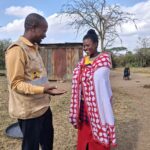The locals here call it ndegu. Globally it is simply green grams. This crop, especially in Kenya, has had its own share of setbacks.
For a very long time, farmers have been complaining of the rapid reduction in green grams yields. But now, farmers in Eastern Kenya’s Kitui County, will soon be smiling all the way to the bank, due to a timely intervention by the Kenya Red Cross Society.
Most parts of Kitui County are favorable for growing green grams which thrive best at an altitude of 0 -1600m above sea level well adapted to sandy loam and clay soils at pH range of 5.5 -7.5. They are drought tolerant with rain fall requirement range between 350 – 700mm per annum. Heavy rain fall results to increased vegetative growth with reduced pod setting and development.
Indigenous green grams have small seeds with the plants maturing at different times. Most of the time they mature late. Consumers complain that such varieties have a lot of stony seeds, which makes a green gram meal difficult to eat.
In an effort to make farming of ndegu more profitable, the Kenya Red Cross Society (KRCS) has embarked on an ambitious intervention that will see the county export all its produce to international markets. All this will be realized through a partnership with the county government that is expected to fetch a whooping Sh4 billion (USD40m) for local farmers a season.
The strategy of this intervention is seen as a major boost to plans by the country government to increase agricultural productivity through promotion of uptake of planting green grams, a drought tolerant crop.
Last month, the humanitarian agency donated the first consignment of 200 tons of certified green gram seeds which appropriate for Kitui County, an area with erratic rainfall and poor market access worth Sh50 million (USD5m) for distribution to 200,000 households with the county.
Speaking at Mutomo market in Kitui South Constituency during a ceremony to distribute the seeds, Secretary General Dr Abass Gulet said the agency had set aside Sh500 million (USD5m) to buy the produce from local farmers to shield them from exploitation by middle men.
Dr Gulet who was accompanied by Kitui Governor, Charity Ngilu said the demand for Kenyan green grams in Asian countries including India, China, Japan, Saudi Arabia, and Pakistan among others was inexhaustible and that farmers should strive to produce more of the crop.
 “We’ll walk with Kitui people in this journey of actualizing the Ndegu revolution and we are willing to give more financial support in providing linkages with better paying international markets,” said Dr Gulet who believes the initiative is real and achievable because the county is endowed with plenty of arable land with very good soils and terrain.
“We’ll walk with Kitui people in this journey of actualizing the Ndegu revolution and we are willing to give more financial support in providing linkages with better paying international markets,” said Dr Gulet who believes the initiative is real and achievable because the county is endowed with plenty of arable land with very good soils and terrain.
In the partnership, the Kenya Red Cross and the county government have pooled 400 tons of seeds worth Sh108 million (USD108,000) for distribution to farmers in the county.
Mrs Ngilu said the targeted households will each get 2kg of free seeds as part of the startup investment. This will be an addition to what the farmers will buy depending on their farm sizes. “If each kilo of seeds yields a bare minimum of 100 kilo produce, this will give our county 40,000 tons of green grams,” Mrs Ngilu said adding that if the harvest was sold at a conservative price of Sh100 (USD10) per kilo it will earn the county an estimated Sh4 billion (USD40m) in one season.
The Governor urged the county assembly to enact strict legislation to protect farmers from brokers who exploit them with poor prices saying her administration had secured good overseas market for the anticipated harvest.
Mrs Ngilu said her government mooted the Ndegu revolution because the county has the best soils for growing the crop which does not require a lot of rainfall. She believes the initiative will eradicate perennial hunger in the county as well as improve livelihoods of residents and reduce poverty. “Never before in the history of our county have we seen so many Red Cross trucks, not bringing relief food but seeds for planting. Today, we declare the days of government relief food over,” she said.
The Governor urged other partners and donors to support the revolution by giving farmers more seeds, farm equipment, technologies on water harvesting and training of farmers on post harvest management.
She said whereas the seeds would have cost a farmer Sh500 (USD5), the county government will subsidize the cost by paying Sh250 (USD2.5) for each farmer while KRCS will top up the balance of the other Sh250 (USD2.5).
Besides the seed support, the county government will assist farmers to access agricultural extension services and technical advice from agricultural experts.
The partnership will further see KRC rehabilitate 20 boreholes, water pipeline and water points as part of the emergency interventions to enable communities in Kitui to access water as they wait for recharge of surface water sources in the short rains.
Green grams are said to have health benefits which are they fight breast cancer, weight control, diabetic friendly, protein source, controls blood pressure and they are also a source of protein.
In Kenya, seeds can be obtained from Kenya Seed Company, Dry Land Seed Ltd, Kenya Agricultural Research and Livestock Organization (KALRO) Katumani and KALRO Kitale.








